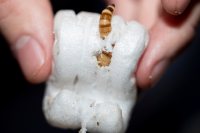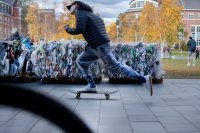
Student video shows the right way to recycle
By Kelly Cox ’11
Stressing the importance of keeping recyclables out of trash and trash out of recyclables, Rob Little ’12 of Auburn premiered his documentary Recycling at Bates College during the Feb.4 EnviroLunch.
Aimed at a student audience, the video emphasizes the proper sorting of trash and recyclables, a dimension to recycling not often considered. Through scenes of dorm waste, cans, and throwaway cups, Little illustrated the environmental and economic effects of sloppy sorting.
An environmental studies major and education minor, Little spent six months creating the documentary at the request of Julie Rosenbach, the college’s sustainability coordinator. Using equipment from the Digital Media Studios and Bates College Television, Little transformed Rosenbach’s abstract ideas into a viral educational video, intended to spread quickly via the Internet.
Little took a course on producing documentaries at the Maine Media Workshop in Rockport, an international center for education and training in photography, film, video, animation, design and book arts, and multimedia. He hopes to use his film talents to advance issues concerning wildlife.
Edited from five hours of footage, the 7-minute, 27-second piece follows recyclables from dorm basements to Lewiston’s Solid Waste Department. In the piece, department Superintendent Rob Stalford points out that it costs the city more to dispose of “contaminated” or badly sorted recyclables.
Stalford explained that recycling is a market-driven process. The industrial purchasers of recycled materials have certain requirements — for example, pure newspaper is worth more than mixed paper. If those requirements can’t be met, purchasers shop elsewhere. “If that falls apart, you’re not recycling,” Stalford said. “You’re creating a lot more work for the disposal process.”
The documentary offers recycling guidelines and illustrates the impact the practice can make. While on the face of it, it appears that an effort is being made, students actually need to pay more attention to how we are disposing of our waste, an average of four and a half pounds per student a day.
“The biggest thing is, of course, education,” said College grounds supervisor John Griffiths, who notes that contaminated recyclables are not longer recyclables — they’re just trash.
Little contrasts student concern for the issue with their wasteful habits, incorporating interviews from the 2009 Waste Audit, a visual presentation outside of Commons that emphasized the campus’ need for better recycling. The short film powerfully accentuates the responsibility of all Batesies to grow a green consciousness.
With some 1,700 students on campus, our participation “is essential to the whole process,” said Little during the noontime screening. “The students’ role in sorting recyclables is the key to profitable and therefore sustainable recycling.”
“Everybody should see this film, students, staff and faculty,” noted Maryli Tiemann of the Maine Campus Compact, a coalition of 18 member campuses that catalyze and lead a movement to reinvigorate the public purposes and civic mission of higher education. “Bates is a community, and we could really make a difference if we did sort our recycling.”
“It is up to all of us to do it correctly,” noted Little at the Envirolunch, a weekly community gathering for all students, staff, and faculty sponsored by the Office of Sustainability and the environmental studies program. “I believe that documentary has the power to teach and inspire people.”




